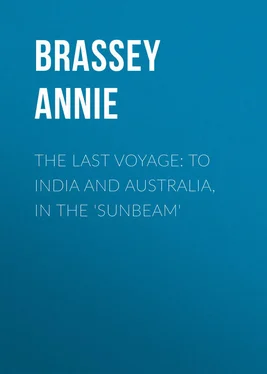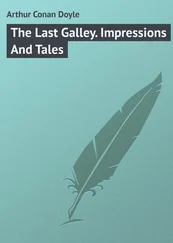Annie Brassey - The Last Voyage - To India and Australia, in the 'Sunbeam'
Здесь есть возможность читать онлайн «Annie Brassey - The Last Voyage - To India and Australia, in the 'Sunbeam'» — ознакомительный отрывок электронной книги совершенно бесплатно, а после прочтения отрывка купить полную версию. В некоторых случаях можно слушать аудио, скачать через торрент в формате fb2 и присутствует краткое содержание. ISBN: , Издательство: Иностранный паблик, Жанр: foreign_antique, foreign_prose, на английском языке. Описание произведения, (предисловие) а так же отзывы посетителей доступны на портале библиотеки ЛибКат.
- Название:The Last Voyage: To India and Australia, in the 'Sunbeam'
- Автор:
- Издательство:Иностранный паблик
- Жанр:
- Год:неизвестен
- ISBN:http://www.gutenberg.org/ebooks/29778
- Рейтинг книги:3 / 5. Голосов: 1
-
Избранное:Добавить в избранное
- Отзывы:
-
Ваша оценка:
- 60
- 1
- 2
- 3
- 4
- 5
The Last Voyage: To India and Australia, in the 'Sunbeam': краткое содержание, описание и аннотация
Предлагаем к чтению аннотацию, описание, краткое содержание или предисловие (зависит от того, что написал сам автор книги «The Last Voyage: To India and Australia, in the 'Sunbeam'»). Если вы не нашли необходимую информацию о книге — напишите в комментариях, мы постараемся отыскать её.
The Last Voyage: To India and Australia, in the 'Sunbeam' — читать онлайн ознакомительный отрывок
Ниже представлен текст книги, разбитый по страницам. Система сохранения места последней прочитанной страницы, позволяет с удобством читать онлайн бесплатно книгу «The Last Voyage: To India and Australia, in the 'Sunbeam'», без необходимости каждый раз заново искать на чём Вы остановились. Поставьте закладку, и сможете в любой момент перейти на страницу, на которой закончили чтение.
Интервал:
Закладка:
Mr. Crawford, who was formerly Commissioner here, had kindly given notice of our probable visit; for we had been anxious to land if possible to see something of King Theebaw, and to inspect the excellent industrial school established here. The district used formerly to be the great recruiting-ground for the Bombay army; but the young men now prefer entering the school, which, from one point of view, seems a pity. It was with much regret that, after having made preparations for landing, we were obliged to abandon the idea of doing so; for it became both late and dark, thus adding too much to the difficulties, and even dangers, of the proposed expedition. We therefore sailed slowly past, throwing up rockets at long intervals, to indicate that we were proceeding on our course.
As the evening wore on the breeze dropped, and during the night we made but little progress.
February 25th. – A calm and somewhat sultry night. Daylight brought a delicious and welcome sea-breeze, before which we sailed rapidly on our southward course. The morning was devoted to a general tidying up, preparatory to settling down for our long voyage.
Over the memory of the latter portion of this day I wish that I could draw a veil; but, sad as is the story, and little as I desire to dwell upon it, it must be told.
Travelling, visiting, and sight-seeing had so completely occupied our time in India, that I had found upon my return to Bombay a vast accumulation of letters from England and elsewhere requiring attention; and as it was far beyond my strength to deal with them without assistance, I considered myself fortunate in securing the services, as temporary secretary, of a gentleman whom we had met at Bombay, and who had been strongly recommended to us. Mr. Frank White was at that time engaged on the staff of the 'Bombay Gazette,' and, as Special Correspondent, had accompanied the present as well as the former Governor of Bombay upon their official tours. Now, however, he was about to leave India in order to take up an appointment on the staff of the 'Melbourne Argus,' and we, as a matter of mutual convenience, offered him a passage to Australia in the 'Sunbeam,' which he accepted, apparently, with delight. These brief facts will account for his presence on board the 'Sunbeam.'
At luncheon to-day Mr. White was cheerful and full of conversation, giving us an interesting description of the annual migration of the members of the Bombay Government to Poona during the season of rains and monsoons. We had, as usual, coffee, cigarettes, and a little gossip on deck before recommencing our quiet occupations of reading or writing. Mr. White strolled aft, and I soon became immersed in my book. Suddenly I perceived a change in the vessel's movement, as if the helmsman were neglecting his duties, and directly afterwards heard the thrilling cry of 'Man overboard!' Of course a great commotion ensued, the men rushing up from below, all eager to render assistance. I ran aft, whence the cry had proceeded, seizing a life-buoy as I passed, but found that one had already been thrown over by the man at the helm, who exclaimed, 'That gentleman,' meaning poor Mr. White, 'has jumped overboard.' A boat was lowered, a man was sent up to the cross-trees, another on to the deck-house to keep a look-out, and the ship was put about in an incredibly short space of time. In the meanwhile hasty preparation of hot bottles, blankets, and other remedies was made on board, in case the boat should happily be successful in her search. But although she rowed over the exact spot many times, and picked up Mr. White's helmet and the life-buoy, nothing more could be discovered.
The agonised interest with which that little boat was watched by all on board will always live in my memory. Two men had jumped into her just as they had rushed on deck, without shirts or hats to protect them from the burning sun. Another was preparing to spring overboard when he was forcibly restrained by Tom, who saw that it would by this time be utterly useless. All on board worked with a will to get the vessel round and to lower every stitch of sail; no easy matter with every kite set, and the yacht running from ten to twelve knots before the wind.
From letters left behind it was painfully clear that a determination of many days past had just been accomplished. It appeared that Mr. White had questioned the doctor – who little suspected his object – as to how long it would take to stop the vessel when running with studdingsails set before a strong breeze. The unhappy man had constantly complained of inability to sleep, and he had been seen on deck the previous night long after everyone else had gone to bed. Of the motive for the rash act it is impossible to form an opinion. Borne down by physical and mental suffering, he must have been overcome by a temporary aberration of intellect, which rendered him for the moment irresponsible for his actions. I need not dwell on the terrible shock which the dreadful catastrophe caused to our hitherto happy little party. The evening was a sad one, and not even the excitement of making the lights off Goa, bringing the ship up, and anchoring for the night, or the prospect of an interesting excursion to-morrow, could raise our spirits or dissipate the depression caused by the sad event of the afternoon.
February 26th. – Orders had been given for steam to be ready in the launch by six o'clock, so that we might get ashore soon after daybreak, and thus avoid the heat of the midday sun, which is now becoming quite a serious matter. But the painful duty of collecting and packing up all poor Mr. White's things to be sent back to Bombay had first to be performed, and it was nearly half-past seven before we were ready to land.
Just as we were starting, Mr. Norman Oliver, the Assistant Delegate at Goa, arrived alongside in his pretty little schooner yacht, of native design and build, but of English rig. He brought with him a very kind letter from Mr. H.D. Donaldson, the assistant engineer of the new Portuguese Railway, now in course of construction, to connect Goa with the English lines northward to Bombay and eastward to Madras. If only the inhabitants of Goa will make use of the new railway, it ought to be of the greatest value to them. Such, however, is their conservative disposition and so great is their pleasure in obstinately creating and maintaining, in the form of customs-duties, obstacles to commerce and free circulation, that it is considered probable that the railway will have to be continued some fifty miles to the southward, as far as the British port of Carwar, before any perceptible increase in the export of produce can be looked for. The line to Goa is now nearly completed, and will, it is hoped, be opened after the rains. Mr. Donaldson kindly proposed a tempting trip over it to the summit of the Sahyádri Mountains, or Ghâts, which form the eastern boundary of the Portuguese territory. Unfortunately we are already so much behind our time that we shall have to press forward as quickly as wind and waves will allow, if we mean to adhere to the original plan of our voyage with anything like punctuality.
So many difficulties are thrown in the way of would-be visitors to the churches of Goa, that although Mr. Oliver had kindly sent his sepoy on to announce our arrival, and had written to the Administrador to ask leave, we were recommended to wait for an hour or two on board, to allow time for the necessary forms to be complied with. A refreshing sea-breeze was blowing, and at ten o'clock we decided to brave the sun and to proceed under the double awnings of the gig (towed by the steam-launch) across the bar and up the river towards Old Goa.
From the sea, the Portuguese settlement looks like a series of promontories, each crowned by a fort, with the river Mandovi in the centre, running up into the interior between richly wooded banks. Its coast-line is some sixty or seventy miles long from north to south, and its greatest breadth about thirty miles. The entire territory is hilly, and intersected by numerous rivers, of which the Mandovi is the most important. Both the ancient and modern cities of Goa have been built on its banks. The promontories of Bardez and Salsette protect a fine harbour, capable of accommodating vessels of the largest tonnage during the greater part of the year. The climate of Goa is generally healthy, though smallpox and cholera have from time to time broken out there with great virulence.
Читать дальшеИнтервал:
Закладка:
Похожие книги на «The Last Voyage: To India and Australia, in the 'Sunbeam'»
Представляем Вашему вниманию похожие книги на «The Last Voyage: To India and Australia, in the 'Sunbeam'» списком для выбора. Мы отобрали схожую по названию и смыслу литературу в надежде предоставить читателям больше вариантов отыскать новые, интересные, ещё непрочитанные произведения.
Обсуждение, отзывы о книге «The Last Voyage: To India and Australia, in the 'Sunbeam'» и просто собственные мнения читателей. Оставьте ваши комментарии, напишите, что Вы думаете о произведении, его смысле или главных героях. Укажите что конкретно понравилось, а что нет, и почему Вы так считаете.









![John Bruce - The Lettsomian Lectures on Diseases and Disorders of the Heart and Arteries in Middle and Advanced Life [1900-1901]](/books/749387/john-bruce-the-lettsomian-lectures-on-diseases-and-disorders-of-the-heart-and-arteries-in-middle-and-advanced-life-1900-1901-thumb.webp)


